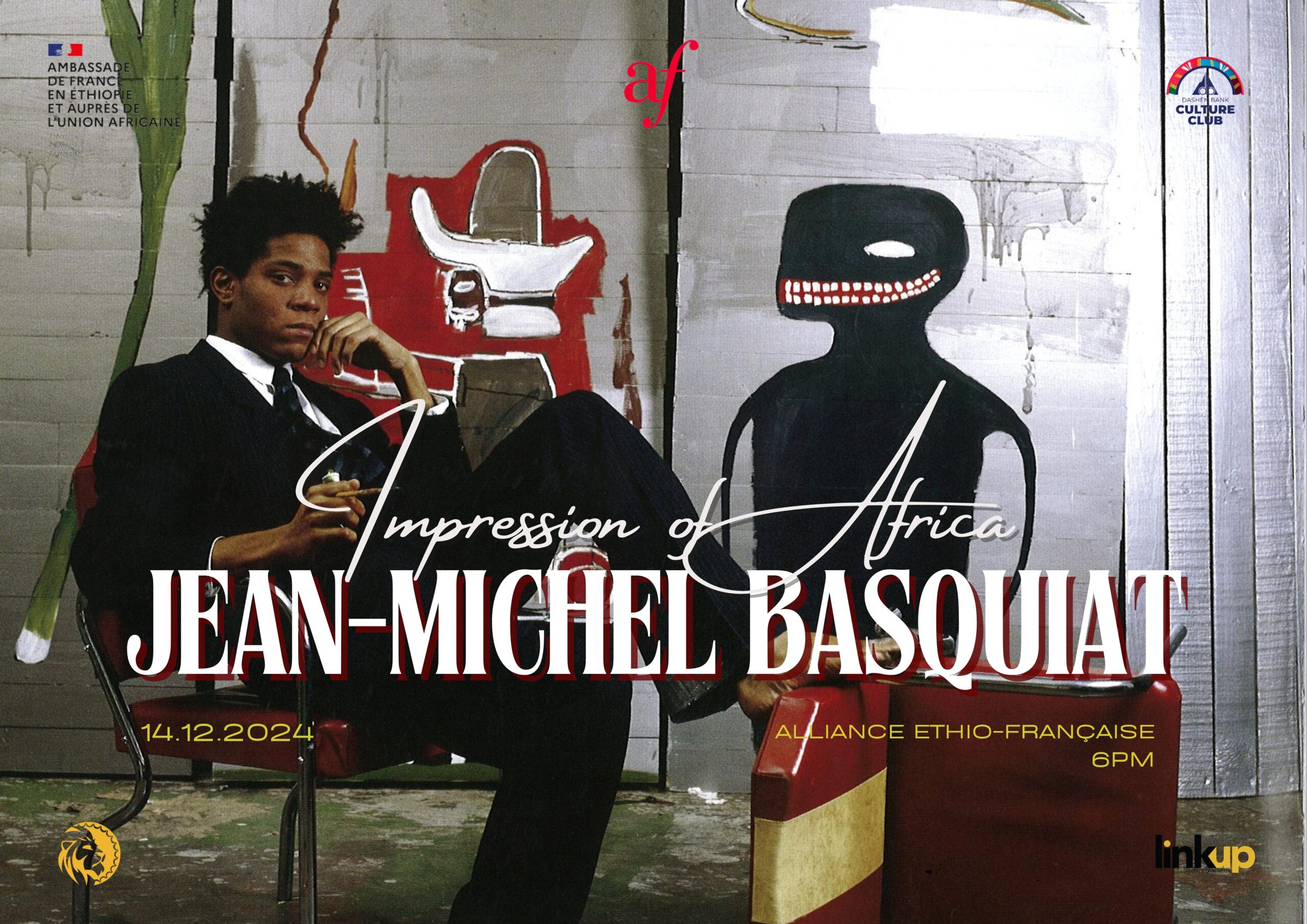
The exhibition offers a unique dialogue between the revolutionary work of Jean-Michel Basquiat, a leading neo-expressionist figure, and Ethiopian contemporary art, a unique and rapidly expanding field on the African continent. As a tribute to Basquiat’s rich and complex cultural heritage, the exhibition seeks to explore to multiple dimensions of his work, while highlighting the creations of Ethiopian artists whose works resonate deeply with the universal themes addressed by Basquiat.
The exhibition aims to create a cultural bridge between Basquiat’s visual rebellion and contemporary Ethiopian voices, which are also striving to be heard on the global stage. By revisiting the African, Caribbean, and African-American influences that shaped Basquiat’s work, the exhibition questions how these influences still resonate today through the works of Ethiopian artists. The viewer will discover how these art forms continue to thrive and evolve, particularly in the context of modern Ethiopian.
Basquiat’s Haitian heritage, mixed with his African roots, has given his work an animist and spiritual dimension where mythological figures and symbols of cultural reappropriation are omnipresent. These elements create an intimate connection between Basquiat’s quest for identity and that of African and Afro-descendant artists who seek to redefine their place in a world marked by social and historical tensions. His paintings, often saturated with symbols, writing and bright colors, reflect a permanent quest for reconciliation between heritage and modernity.
This political and mystical dimension finds a deep echo in Ethiopian contemporary art, which is in full evolution. Ethiopian artists, while drawing inspiration from their ancestral roots, are developing new visual approaches that question their cultural heritage while exploring their place in a globalized world. Their search for identity and their desire to engage in dialogue with other cultures outside of their own are at the heart of Ethiopian creative dynamics. The works exhibited, combining tradition and innovation, offer a profound reflection on collective memory, the diaspora and the postcolonial issues of the African continent, without denying the spiritual and historical richness of their own country.
Impression of Africa: Jean-Michel Basquiat thus aims to create a visual conversation between Basquiat’s aesthetic and that of contemporary Ethiopian artists, highlighting the importance of his thees in the African context. The works exhibited will reflect this rich intercultural exchange, where art becomes a means of rebuilding bridges between past and present, between resistance and spirituality, between claim and aesthetic exploration.
L’exposition propose un dialogue unique entre l’œuvre révolutionnaire de Jean-Michel Basquiat, figure majeure du néo-expressionnisme, et l’art contemporain éthiopien, un domaine unique et en pleine expansion sur le continent africain. En hommage à l’héritage culturel riche et complexe de Basquiat, l’exposition cherche à explorer les multiples dimensions de son œuvre, tout en mettant en lumière les créations d’artistes éthiopiens dont les œuvres résonnent profondément avec les thèmes universels abordés par Basquiat.
L’exposition vise à créer un pont culturel entre la rébellion visuelle de Basquiat et les voix éthiopiennes contemporaines, qui s’efforcent également de se faire entendre sur la scène mondiale. En revisitant les influences africaines, caribéennes et afro-américaines qui ont façonné l’œuvre de Basquiat, l’exposition s’interroge sur la manière dont ces influences résonnent encore aujourd’hui à travers les œuvres des artistes éthiopiens. Le visiteur découvrira comment ces formes d’art continuent de prospérer et d’évoluer, en particulier dans le contexte de l’éthiopien moderne.
L’héritage haïtien de Basquiat, mêlé à ses racines africaines, a donné à son œuvre une dimension animiste et spirituelle où les figures mythologiques et les symboles de réappropriation culturelle sont omniprésents. Ces éléments créent un lien intime entre la quête d’identité de Basquiat et celle des artistes africains et afro-descendants qui cherchent à redéfinir leur place dans un monde marqué par des tensions sociales et historiques. Ses peintures, souvent saturées de symboles, d’écritures et de couleurs vives, reflètent une quête permanente de réconciliation entre héritage et modernité.
Cette dimension politique et mystique trouve un écho profond dans l’art contemporain éthiopien, en pleine évolution. Les artistes éthiopiens, tout en s’inspirant de leurs racines ancestrales, développent de nouvelles approches visuelles qui questionnent leur héritage culturel tout en explorant leur place dans un monde globalisé. Leur recherche d’identité et leur désir d’engager un dialogue avec d’autres cultures en dehors de la leur sont au cœur de la dynamique créative éthiopienne. Les œuvres exposées, alliant tradition et innovation, proposent une réflexion profonde sur la mémoire collective, la diaspora et les enjeux postcoloniaux du continent africain, sans pour autant nier la richesse spirituelle et historique de leur propre pays.
Impression of Africa : Jean-Michel Basquiat vise ainsi à créer une conversation visuelle entre l’esthétique de Basquiat et celle des artistes éthiopiens contemporains, soulignant l’importance de ses œuvres dans le contexte africain. Les œuvres exposées refléteront ce riche échange interculturel, où l’art devient un moyen de reconstruire des ponts entre passé et présent, entre résistance et spiritualité, entre revendication et exploration esthétique.
Collection
Our collection features works from renowned and up-and-coming artists from Ethiopia, whose works are reflect a connection to the pieces made by Basquiat.
This collection links Ethiopia to Basquiat, with his techniques, perceptions and likeness represented throughout.
17 ARTISTS
80+ ARTWORKS
14 SCULPTURES
120+ METERS FOOTPATH
GALLERY HOURS
These are regular opening hours.
There can be extended opening times based on individual request and/or events organized at the Alliance. Please contact assistantculturel@allianceaddis.org to arrange a visiting time for your group/classroom/company.
